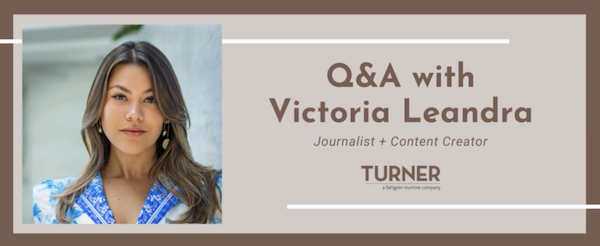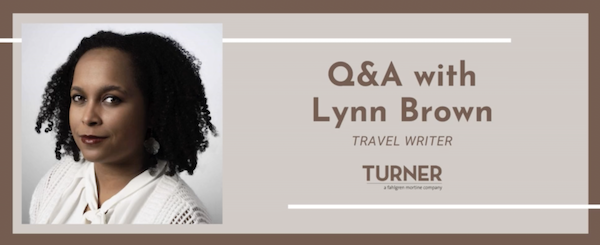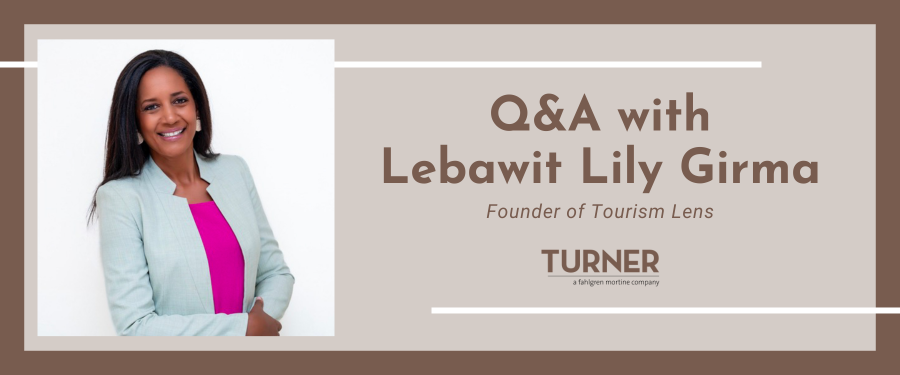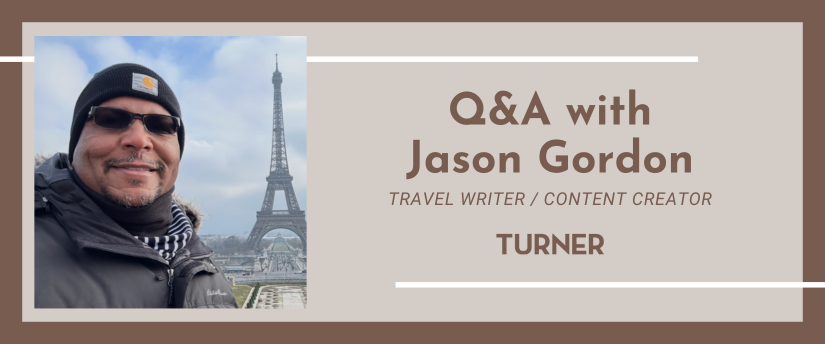TURNER Q&A: Lynn Brown
Lynn Brown is a writer, professor, digital storyteller and traveler whose work centers on issues of race, place, culture and history. Currently the...

An award-winning journalist, Victoria Leandra works at the intersection of social justice, travel, food and culture. She’s been noted by some big names — Victoria was recently recognized as "the future of journalism" by the Smithsonian's National Museum of American History. To get her thoughts on where she’s been and where she’s going, TURNER hopped on Zoom with Victoria recently.
I love journalism. That's what I've always wanted to do — since I was a little kid, I realized it was the path for me. I love asking questions and getting to know the world at a deeper level. But I didn't know that I could travel as a profession. I started as a social justice, politics and news reporter, because that's sort of the traditional path for, quote-unquote, a “real” journalist. As soon as I realized that I could integrate my passion for travel with my career, I completely switched gears. I started doing what I love, which is traveling and then sharing my experiences with the world. Today, I have a following on both Instagram and TikTok and I've been able to make a living out of traveling, both as a multimedia journalist and content creator.
There’s a difference in how I approach storytelling because of my journalism background. An influencer might just share with people what restaurants to go to or budgeting tips to save on travel. The way that I approach things is much more from a cultural perspective.
I went to Morocco recently. While I was there, one of the things I asked myself was, “Where are the women?” I was just not seeing women working there — maybe running errands, but not much. It was noticeable from a US perspective. A local told me that there is not much of a role in Moroccan society for women to work in public. Women are still at home, serving as the primary caretakers of the family, but my story ended up being about the new generation of Moroccan women, mostly young women, who are going against the status quo. They’re getting into the storytelling tradition — which is mostly dominated by men. I don't think a regular content creator would have uncovered that kind of topic. They may not have the incisiveness of a journalist, or they simply might not ask the right questions.
Of course, a lot of content creators who go to Morocco will share what it was like to ride a camel in the desert — and I did that, too. I shared those beautiful pictures; I shared that beautiful video. But there is also an audience that resonates with a much more educational way of traveling. To me, traveling is an investment, a way to continue furthering your education beyond high school and college, you get to know different realities and different perspectives of people.
If I had to summarize it, it’s taking the human approach. And you can do that with all angles, including luxury culinary experiences and hotels. When you talk to people and go beyond the surface level, that's where the truly authentic and local perspectives are.
I believe so. I'll give you an example — I’m a born and raised Puerto Rican — so I wrote a story after Hurricane Maria where the headline was “Yes, You Should Be Traveling To Puerto Rico Now — Here's How To Do It Responsibly.” But I've also highlighted the high-end of the island with award-winning restaurants, hotels and wellness retreats. Both spectrums are part of the island’s reality. It wouldn't be true for a content creator or for a writer to talk about only the luxurious side of the island or only the challenging parts of the island. It’s a matter of contextualizing them.
Of course, visitors don’t know everything that's going on in the island. But they are responsible for knowing their impact during their visit. For example, if you're coming to Puerto Rico, with a little research you’d know that its electrical infrastructure is not great so if at any point the electricity goes out — well, you kind of knew that could happen. If you want to get to know the best of what a place offers, you also need to learn about what the local community is going through.
To be completely frank, I think the people who want to just lie in the sun are older folks. For Gen Z, that’s not how we travel. And you can see evidence of that from the content that is consumed online and various trend reports. I'm part of that generation of people who care about the places that we travel to. That is the audience that I have and it’s the audience that I strive to continue serving — people who want to enjoy the unique experiences another country offers, but also want to be conscious and contribute to the local ecosystem.
There are a couple of things that I want to see more of. One is adventurous travel stories. I went viral on TikTok because of a recent story like that — I stayed at one of the most dangerous hotels in the world in Peru. It’s these hanging capsules up on the side of a cliff. It is insane [laughs]. But I love that sort of active, immersive traveling. I just love to show people that when you go to Peru, you can go to the mountains, you can go to the beaches, you can go to the desert. I love showing the “off the beaten path” of every location I visit.
It's similar when it comes to food. I was recently featured on Food + Wine as the “leading Latinx voice of NYC.” With food, I want to taste the spectrum, as I call it. I’ve dined at the number one restaurant in the world right now, Central, but I also love to show off the affordable eats you can get from street food vendors. That’s the first question I ask when I land somewhere and I’m in an Uber: “What do you eat on a daily basis?” And whatever your driver says, you write it down. You don’t want to end up just eating things that a local has never tasted.
On the other side, I’m Latina, and before I started doing all of this, I didn’t realize that travel journalism and content creation was a possibility for me. Because you don’t really see our community featured as journalists or content creators. On the content creator side, it’s more accessible because you have the power over your own social media. So, I always feel super proud to be one of those voices. I’m showcasing what’s possible for other people; it’s something I would’ve loved to see when I was growing up. I love hearing people in my audience say, “Tell me more about how you became a travel journalist!”
I write stories for digital publications, I’ve produced award-winning video series, and I’m also a travel host. So, you can tap me for any of those things. But I want to be very specific when I receive an invite. Is this for my own content on TikTok and Instagram? Or are you reaching out to me as a writer/journalist? For most people who do all of these things, we treat them separately. Sometimes, I’ve had situations in the past where a PR person invites me as a journalist but then they also want social media coverage on my channels. It’s a little bit unfair, because then you’ve been given extra deliverables.
A good rule of thumb is to reach out specifically with what you’d like from that individual. If you want me as an influencer, I’m happy to discuss rates. If you’re reaching out to me as a writer, let’s chat possible angles and publications I can pitch to. Understanding the difference between these roles is important. There are a lot of pros with working with someone who does both. But we just want to make sure we’re compensated fairly. So, it's just a matter of having that conversation — I love getting on the phone, meeting someone 1-1 to understand the clients’ needs and then what we can work on together.
Follow Victoria’s further adventures on Instagram, TikTok and LinkedIn.

Lynn Brown is a writer, professor, digital storyteller and traveler whose work centers on issues of race, place, culture and history. Currently the...

As the founder of Tourism Lens and a full-time travel news reporter at Bloomberg Pursuits, Lebawit Lily Girma’s passion for storytelling is only...

Driven by a deep-seated love for exploration, Jason Gordon has become a highly respected voice in the travel world and the cruise industry. As a...